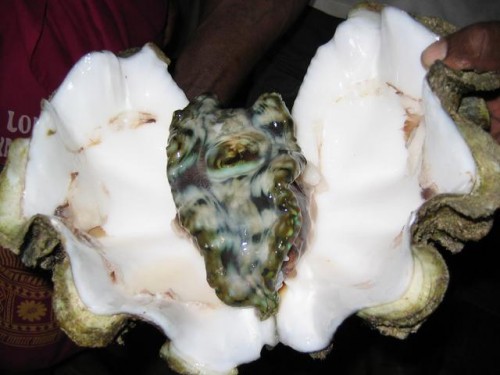|
OYSTER >> Restfulness of the External Mind
 Low things are not necessarily bad; whether they are good or bad depends much upon their proper subordination and proportion. The love of eating and the love of sleeping are low; if excessive, they are bad; but if just strong enough to assist in recreating higher faculties, they are good and useful. Low things are not necessarily bad; whether they are good or bad depends much upon their proper subordination and proportion. The love of eating and the love of sleeping are low; if excessive, they are bad; but if just strong enough to assist in recreating higher faculties, they are good and useful.
The popular expression, “lazy as an oyster,” probably comes pretty near to the human quality which the oyster represents. In excess we call it “laziness”; in moderation it may be a good enjoyment in repose. When undisturbed, an oyster
is certainly a picture of repose itself. It has no power to change its place, and not the slightest desire to do so. Its shell stands partly open, held by the elasticity of its hinge. The water which brings air to its gills and particles of food to its stomach is indeed helped in its circulation by ciliary motions, of which the animal probably is entirely unconscious, and by slight movements of its mantle. It produces young, it is said, at the rate of two or three millions in a year, during the months of May to August inclusive—a prodigious swarm of helpless little desires to lie still, which for a few days are busy finding a place to be quiet in, and then never move again, nor want to. Of these the parent has at first perhaps a faint parental fondness; but she does scarcely anything more for them than to secrete a little limy fluid which hardens on the little ones into the rudiments of a shell.
The shell is to an oyster the most important thing in the world. It is home, protection, and opportunity for repose. The one great muscle which an oyster has is the muscle which closes the shell. This corresponds to a desire to prevent intrusion; and the shell itself to the laws and facts which justify rest and seclusion. It is easy to see in all this a description of some morbid states of mind—when the love of seclusion is excessive—and of some healthful states. Our common country and seashore resting places might fairly be called “oyster beds,” on which people lie about enjoying their rest, and catching at the most trifling entertainments to keep them alive. But there is a deeper and nobler meaning, at least to some oysters, than this. Pearls are found in oysters; and they are made of the substance of the inner shell. When a grain of sand or other hard substance is intruded within the shell, and the animal is unable to expel it, a secretion of shelly substance is deposited upon it, which at least shuts it out from irritating contact with the sensitive animal. And this deposit, which grows by successive layers, is the pearl. From the point of view of the living animal, the surface of the pearl is the inside, and the intrusive material is shut out.
Of pearls are made the gates of the Holy City. The intruded materials which cause their formation are the insinuations and suggestions of evil from hell, which induce states of temptation. The pearly substance by which these are shut out from the mind are the truths which forbid such evils as sins against God, and brand them as of the devil and from the devil. Swedenborg calls the gates of pearl “introductory truths”; but the truths which introduce into the streets of the Holy City are truths which separate evil from good, and open the way to good life at the same time that they shut out the evil. So the pearls of our city of life are the truths we have lived which forbid evils as sins; which truths are lovely walls of protection to the good life within. The one pearl of great price, for which the merchant sold all that he had, and to which the kingdom of heaven is likened, is the knowledge of salvation by the Lord, through His commandments.
The enjoyment of such protection and of the repose which it brings—not in the peacefulness of the interior mind, but the restfulness of the external mind, next the body—is an oyster in its best sense.
Author: JOHN WORCESTER 1875
|